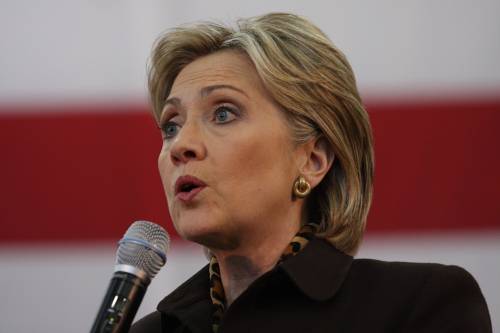Clinton Speech Signals Transformation at State
In Hillary Clinton’s first major foreign policy address as secretary of state, she made the case for changes in how the Obama administration’s national security agenda will be carried out.
Jul 31, 2020270.6K Shares3.7M Views
Secretary of State Hillary Rodham Clinton (WDCpix)
Over the last several days, Secretary of State Hillary Rodham Clinton has quietly begun institutionalizing the Obama administration’s pledge to rebalance civilian and military elements of national security. Her speech to the Council on Foreign RelationsWednesday afternoon is her most visible attempt yet to make a case for transforming the State Department and the U.S. Agency for International Development’s place in the national-security pantheon in order to suit U.S. foreign policy goals.
Clinton’s speech, delivered to an audience of foreign-policy elites, didn’t announce any new policy or change of course. She made a case for administration priorities like multilateral reductions in nuclear arms and proliferation, engagement with adversarial nations like Iran, midwifing a resolution to the Israeli-Palestinian conflict and promoting global human rights. Like most post-Cold War secretaries of state, she called America’s global leadership an enduring fact of the geopolitical landscape, and cast responsible U.S. foreign policy as shepherding a “global architecture” whereby states have “clear incentives to cooperate and live up to their responsibilities, as well as strong disincentives to sit on the sidelines or sow discord and division.”
Illustration by: Matt Mahurin
But the speech itself was less a policy address than a platform to explain how changes that Clinton has recently initiated to prepare the State Department and USAID to shoulder more of a national security burden match the administration’s objectives. On Friday and again on Monday, Clinton held townhall meetings with foreign-service officers and development workers to unveil a new project, called the Quadrennial Diplomacy and Development Review. Modeled on one of the Pentagon’s most prominent reports, Clinton’s announced effort is designed to match the department’s missions with its resources and identify shortfalls in capacity, and will presumably recommend necessary institutional changes.
The study, led by Deputy Secretary Jack Lew and Policy Planning Director Anne-Marie Slaughter, will also address internal reform issues on core department and USAID tasks. It will “explore how to effectively design, fund, and implement development and foreign assistance as part of a broader foreign policy,” Clinton said, chiding U.S. foreign-aid money for insufficiently “contribut[ing] to genuine and lasting progress.”
For years, the State Department has lacked even the basis for understanding how underresourced it is. In October, a report by the American Academy of Diplomacy, a diplomatic advocacy group, assessed that the Secretary of State “lacks the tools — people, competencies, authorities, programs and funding — to execute the President’s foreign policies.” State did not even compile documents or reports designed to link resources to foreign-policy missions. The result was “the ‘militarization of diplomacy’ is noticeably expanding,” the study found.
The QDDR is “an intelligent measure” to begin reversing the trend, said retired Amb. Ronald Neumann. Clinton’s “focus on resources is important and has been too often neglected by secretariess of state who focused only on policy,” said Neumann, a former ambassador to Algeria, Bahrain and Afghanistan. “She understood she’s not going to manage effectively with a busted institution.”
One of the Obama administration’s earliest steps to bolster State Department capacity was to increase the State Department’s operating budget by $2 billion, mandating the hiring of over 700 new Foreign Service staff to meet worldwide shortages of diplomats, and to increase the foreign aid budget by nearly 10 percent to $51.7 billion. In an rare move, Defense Secretary Robert Gates lobbiedCongress in favor of giving the State Department more money, on the grounds that an under-resourced department created a burden on the military to fill gaps in diplomatic positions. Similarly, prominent military leaders like Gen. David Petraeus, commander of U.S. troops in the Middle East and South Asia, have frequently advocated a “whole-of-government approach” to complex security problems like the Afghanistan war and related instability in Pakistan, urging robust diplomatic and development resources to be used to supplement military measures. Clinton used the phrase twice in her speech.
A core goal for Clinton will be “to ensure that our civilian and military efforts operate in a coordinated and complementary fashion where we are engaged in conflict,” she said. In places like Afghanistan, the department has pledged to bolster its civilian diplomatic and developments, but few diplomats have made the journey so farto dangerous regions like Helmand Province, where 4000 Marines are battling the Taliban to provide security and governance for Afghan civilians.
The QDDR will require the State Department and USAID “to think hard about whatever we want to achieve” and to “demonstrate results,” Clinton said. That process will position the civilian elements of foreign affairs to more effectively manage and reform global institutions. “We’ll use our power to convene, our ability to connect countries around the world, and sound foreign policy strategies to create partnerships aimed at solving problems,” Clinton vowed in her speech, saying that the U.S. needed to “create opportunities for non-state actors and individuals to contribute to solutions.”
Clinton’s focus on institutional reform is a welcome change, Neumann said, contributing to her emergence as a strong secretary of state. “Overall, it’s very hard to say she’s put a foot wrong anywhere in any significant way,” he said.

Rhyley Carney
Reviewer
Latest Articles
Popular Articles

